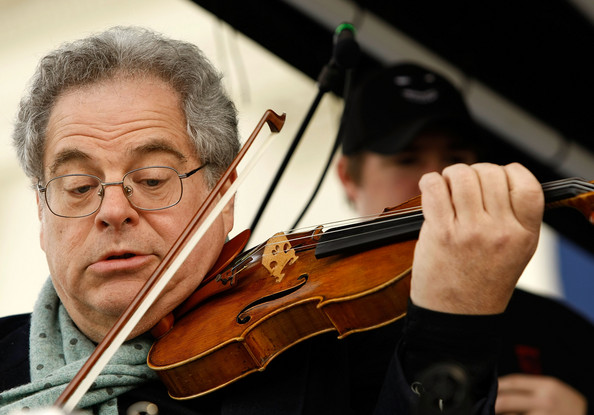The most difficult instrument to play in the world has been left to only a small group of musicians to evoke its best qualities and conquer its tyrannical restrictions. The violin, a stringed instrument perhaps most closely tied to human voice and expression, is capable of both heavenly expression and shrieking vocalization. Performing the works of the great masters has always required a special measure of self esteem with an unruly instrument in which no sound is guaranteed, where the strings may break under the strain, and the entire sound can fall out of key from the climate of the performance hall alone. The great performers have as a result tended to beimperious titans- Paganini, Heifetz, Oistrakh. The job of bringing human frailty and gigantic talent together and celebrating it all has fallen to one humanity’s most gregarious ambassadors of music, Itzak Perlman. Now 66 years of age, Itzak Perlman has provided throughout his musical life a continuous conversation with the public as to the human nature of music, communicated the underlying difficulties in creating great music, and made all of us part of the experience. His special personality, his common man humanness, has bonded new generations to the ongoing story of classical music, and prevented it from becoming an archaic shadow of a disappearing time. The great violinist and humanitarian, an ongoing preservationist of some of western civilization’s greatest creations, Itzak Perlman, is Ramparts People We Should Know #18.
Itzak Perlman is a native Israeli, borne in Tel Aviv in 1945, just prior to the founding of the country, and with his communication and musical skills, one of that country’s greatest ambassadors. He showed prodigious musical abilityfrom age three onward, and was recognized as a special talent that deserved the best teachers. His parents saw that he transitioned to the United States to Juilliard School of Music, where he received the attention of a giant in violin instruction, Ivan Galamian, and his assistant Dorothy DeLay, legends in their own field of performance training. Though many have had significant talent, Perlman’s special personality articulating that talent made him stand out from all others. Stricken at age four with the vicious effects of polio, which left his lower extremities atrophied and useless, Perlman never showed the slightest willingness to given in to his disability, his personality ebullient and positive in the face of such challenge. In the modern world, this translated beautifully to mass media. The young Perlman at age 13, was an early visitor to the Ed Sullivan Show, which for two decades was the formal venue of introduction to America of any emerging, important talent. But this performer was not just a Liberace for the stringed instrument, he was a mountain of talent who rivalled the greats in both playing ability and in his devotion to the craft of performance. As Perlman entered into adulthood, he and like minded artist friends like Daniel Barenboim, Pinchas Zukerman, and Yo Yo Ma recognized and facilitated the power of television to reach out to a mass audience that would might never enter the concert hall, and with his personality, show classical music to be an approachable form of the human experience.
Perlman’s ability to tell a story has connected his audience directly to the real life humanity of the composers and the performers who have become famous bringing the composers musical expressions to life. He has made all aware that the performer is not a perfect machine, but rather one capable of the same emotions as any other human, anxious about difficult musical challenges, desirous of bringing forward certain feelings, wary of their own weaknesses as well as strengths. He has made the listener innately appreciative of the art, as one watches the performer Perlman overcome his disability, challenge himself to bring a unique interpretation to the music, and in the end, revel in and celebrate the soaring accomplishment of the human capacity to create and express in a way that elevates us all.

